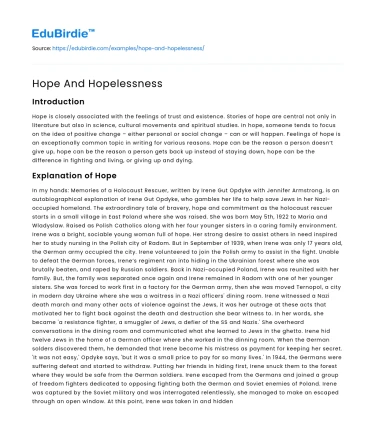Introduction
Hope is closely associated with the feelings of trust and existence. Stories of hope are central not only in literature but also in science, cultural movements and spiritual studies. In hope, someone tends to focus on the idea of positive change – either personal or social change – can or will happen. Feelings of hope is an exceptionally common topic in writing for various reasons. Hope can be the reason a person doesn’t give up, hope can be the reason a person gets back up instead of staying down, hope can be the difference in fighting and living, or giving up and dying.
Explanation of Hope
In my hands: Memories of a Holocaust Rescuer, written by Irene Gut Opdyke with Jennifer Armstrong, is an autobiographical explanation of Irene Gut Opdyke, who gambles her life to help save Jews in her Nazi-occupied homeland. The extraordinary tale of bravery, hope and commitment as the holocaust rescuer starts in a small village in East Poland where she was raised. She was born May 5th, 1922 to Maria and Wladyslaw. Raised as Polish Catholics along with her four younger sisters in a caring family environment. Irene was a bright, sociable young woman full of hope. Her strong desire to assist others in need inspired her to study nursing in the Polish city of Radom. But in September of 1939, when Irene was only 17 years old, the German army occupied the city. Irene volunteered to join the Polish army to assist in the fight. Unable to defeat the German forces, Irene’s regiment ran into hiding in the Ukrainian forest where she was brutally beaten, and raped by Russian soldiers.
Save your time!
We can take care of your essay
- Proper editing and formatting
- Free revision, title page, and bibliography
- Flexible prices and money-back guarantee
Back in Nazi-occupied Poland, Irene was reunited with her family. But, the family was separated once again and Irene remained in Radom with one of her younger sisters. She was forced to work first in a factory for the German army, then she was moved Ternopol, a city in modern day Ukraine where she was a waitress in a Nazi officers' dining room. Irene witnessed a Nazi death march and many other acts of violence against the Jews, it was her outrage at these acts that motivated her to fight back against the death and destruction she bear witness to.
In her words, she became 'a resistance fighter, a smuggler of Jews, a defier of the SS and Nazis.' She overheard conversations in the dining room and communicated what she learned to Jews in the ghetto. Irene hid twelve Jews in the home of a German officer where she worked in the dinning room. When the German solders discovered them, he demanded that Irene become his mistress as payment for keeping her secret. 'It was not easy,' Opdyke says, 'but it was a small price to pay for so many lives.'
In 1944, the Germans were suffering defeat and started to withdraw. Putting her friends in hiding first, Irene snuck them to the forest where they would be safe from the German soldiers. Irene escaped from the Germans and joined a group of freedom fighters dedicated to opposing fighting both the German and Soviet enemies of Poland. Irene was captured by the Soviet military and was interrogated relentlessly, she managed to make an escaped through an open window. At this point, Irene was taken in and hidden from the Russians by some of the same people she had hidden.
These friends would later disguise her as a Jew and smuggle her to a camp for displaced persons in Hessich-Lictenau in Germany. While in the camp, Irene met William Opdyke, a United Nations delegate who was sent there to interview survivors of the war. Moved by Irene's story, he told her that America would be proud to have her as a citizen. So in 1949, Irene went to New York to start a new life in America. She worked in a clothing factory and lived in Brooklyn. Five years later arrival in America, Irene Gut Opdyke became a United States citizen.
Conclusion
Finding and maintaining hope can be one of the most important things in a person's life. Hope gives people a reason to keep trying and it helps you see the good in bad things. Seeing the good in a bad situation, as hard as it may be, is very important. In the novel In My Hands, hope is mentioned throughout the book. “For the young people, who can accomplish the impossible and can achieve greatness by finding strength in God and the goodness of the human spirit. I dedicate my life story to encourage them to find hope and strength within themselves.” (pg.3). Irene Gut’s dedication to all young people is one of the many examples how hope in your life can only help. In Irene’s mention of hope shows how she didn't lose her hope even when everything seemed over and that is why she was able to survive.






 Stuck on your essay?
Stuck on your essay?

